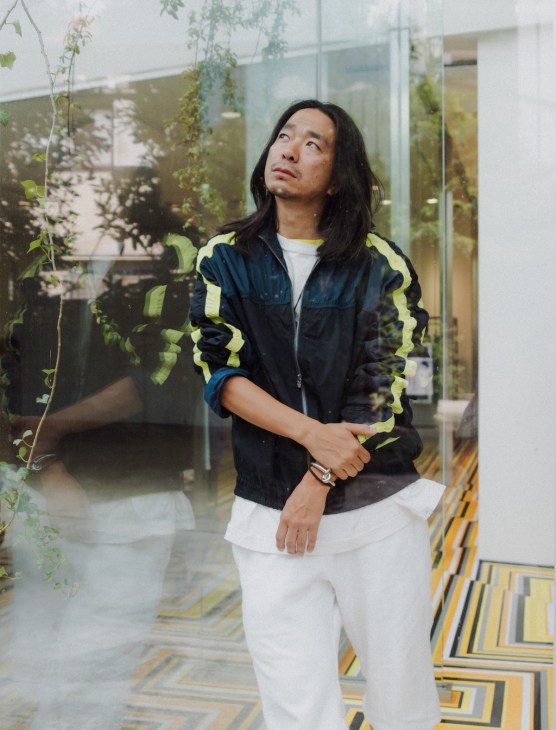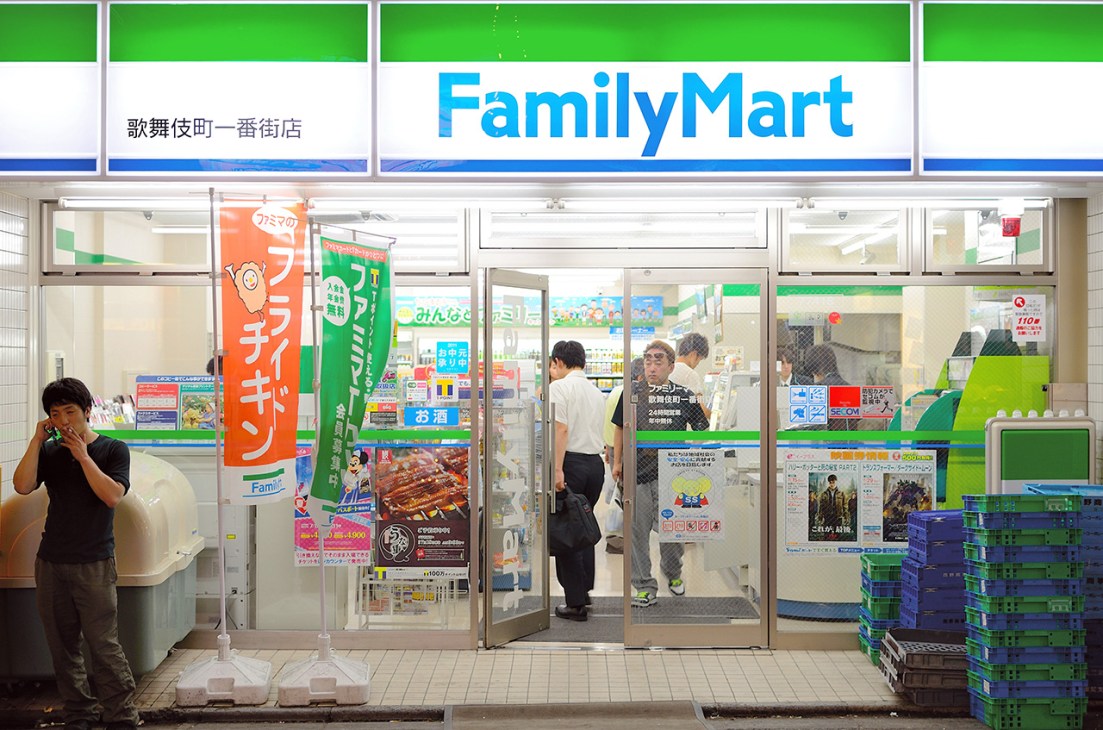While Japan’s more than 50,000 convenience stores – konbini – are an indispensable part of daily life, they’ve tended to stay away from the realm of fashion, beyond offering clean underwear or perhaps an emergency shirt and tie. That all changed in 2021 when FamilyMart – operator of nearly 16,300 convenience stores in Japan – teamed up with the Tokyo fashion designer Hiromichi Ochiai to launch its own intuitively named label, Convenience Wear. The range debuted to instant success. Its unisex crew socks – white with stripes in FamilyMart’s signature green and blue – flew off the shelves. Worn by everyone from school children to the fashion set, more than 1.4 million pairs were sold in a year and the line won a coveted Good Design Award. Convenience stores had never been seen as cool and the new brand’s desirability was a shock to the system.

From the outset, Ochiai intended Convenience Wear to be a simple proposition, in keeping with the universality of the convenience store. The decision to start with socks, the most basic staple, was easy. “In Japan, konbini represent this feeling of cleanliness, stability and safety,” Ochiai tells Monocle. “So, I wanted to express this very clean image and the sock seemed to be the ideal vehicle. Plus, everyone knows the brand’s iconic colours.” The socks emerged as the hero product: cheap but well made with a thick pile, they’re also antibacterial and deodorising.
Ochiai, who has had his own fashion brand, Facetasm, since 2007, also had a clear vision of how he wanted Convenience Wear to appear on the shelves. “In the context of the convenience store, we knew that the design would have to be seen and understood immediately by people of all ages, occupations and nationalities,” he says. Ochiai worked with graphic designer Takahiro Yasuda and his collective, Cekai, to come up with a bold style that stands out among the hundreds of other products. “I requested that the information should be easy to understand and readable in katakana, kanji and English.”
The tough, clear-plastic packaging is designed to be reused. “Reusability can be difficult with mass production,” he says. “But I thought of a style that could be opened and resealed.” The packaging also protects the products from wear and tear. “Between the 24-hour-a-day lighting and the dust, a konbini is a very difficult environment for selling clothes.”
Initially the range was limited to the socks and a few essentials – men’s undershirts, women’s tank tops, eco-bags and small hand towels – but the simplicity of the line’s design and purpose has made it easy to expand. You might find sweatshirts, stationery, handkerchiefs, packable nylon jackets and long-sleeved cotton T-shirts.

Ochiai’s own status in the fashion world has made it easier to find collaborations too. The oversized T-shirts made with Akio Hasegawa, a longtime Monocle stylist, and his brand, Cahlumn, sold out in no time. At the Fuji Rock Festival, staff wore Convenience Wear T-shirts and there were special-edition socks and hand towels.
Convenience Wear’s hand towels are made in Imabari, the towel-making centre of Japan. “We’re not particularly focused on ‘made in Japan’,” Ochiai says. “But for the way we wanted to make the pieces and the ability to introduce new colours, Imabari just made sense – they could make high-quality pieces quickly.” Ochiai, who studied at Bunka Fashion College, is bringing his fashion sensibility to the less-than-fashionable shelves of the convenience store. One striking thing about the brand is its unusual colour palette. The basic blacks, whites and greys are all there but they are punctuated with sophisticated pops of colour that call for the confidence of a seasoned designer.
“We use the brand to communicate,” says Ochiai. “When it’s winter, we might use warmer colours to indicate that spring is on its way. With Fuji Rock Festival, we used optimistic neon colours to reflect that it’s a friendly, family event.”
Ochiai’s own brand, Facetasm, is nothing like Convenience Wear – it’s far more directional and beloved of fashion followers. But he knew what this project called for. “Boys in Japan have always looked at magazines and shops for ideas and trends; I think that the convenience store could be a similar tool,” he says. “We’re trying to build a new konbini culture.” Convenience Wear also reflects Japan’s particular style mix – an inimitable blend of high and low.
FamilyMart made another unexpected move earlier this year when it announced that streetwear supremo Nigo – of A Bathing Ape and now Human Made fame – was now on board as the wider company’s creative director. Nigo isn’t involved in the Convenience Wear project but his arrival points to an awareness that the konbini occupies a unique space in Japanese society; the ideal place to catch the attention of the broadest audience possible. Ochiai says that it’s the democratic nature of the convenience store that makes his concept work. “FamilyMart talks about ‘loving yourself’, buying something for yourself in your own time and at your leisure.”
Given the number and ubiquity of FamilyMarts around Japan – something with which no fast-fashion company could compete – the potential for Convenience Wear is huge. “We are already effectively the world’s largest clothing shop,” says Ochiai. The brand strayed into fashion territory with a one-off runway show in 2023, which prompted the creation of a prototype denim jacket. Ochiai, who oversees the creative direction of every product, would love to design trainers but he’s always careful to keep Convenience Wear on the functional side. An accessible price point is key but at a level where the quality still remains high.
The next challenge could be to create a Convenience Wear flagship. But how to improve on the existing FamilyMart shops? They’re accessible to all, 24 hours a day. Ochiai keeps an open mind. “Nobody has tried to do what we’re doing in a convenience store,” he says. “It’s a new experience. I’m constantly experimenting with fresh ideas.”
FamilyMart in numbers
16,295
Number of FamilyMart shops in Japan (8,412 overseas)
1973
Year of launch
15 million
Daily customers (in all shops in Japan)
¥3.2trn (€19.6bn)
Annual sales (fiscal year: March 2024 to February 2025)


